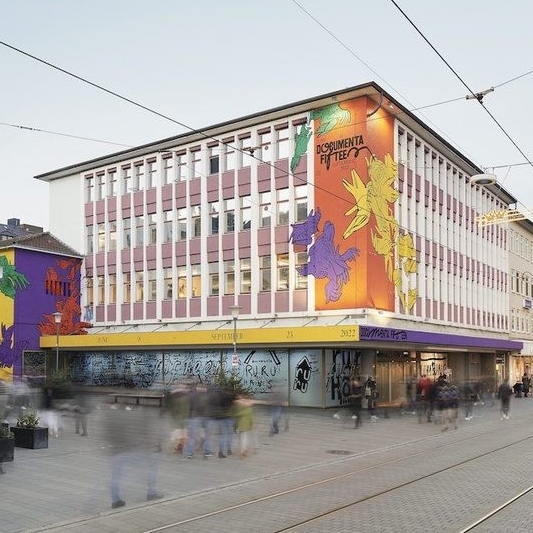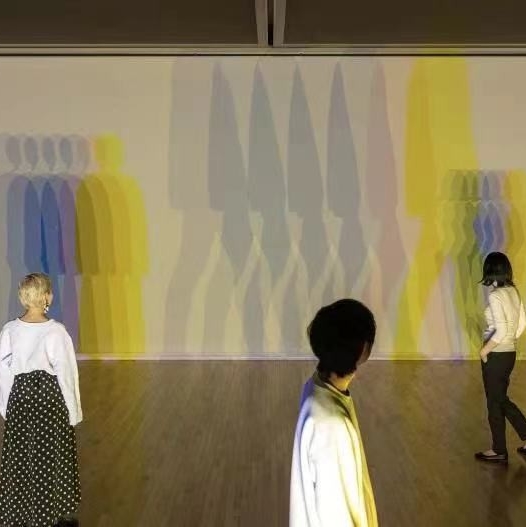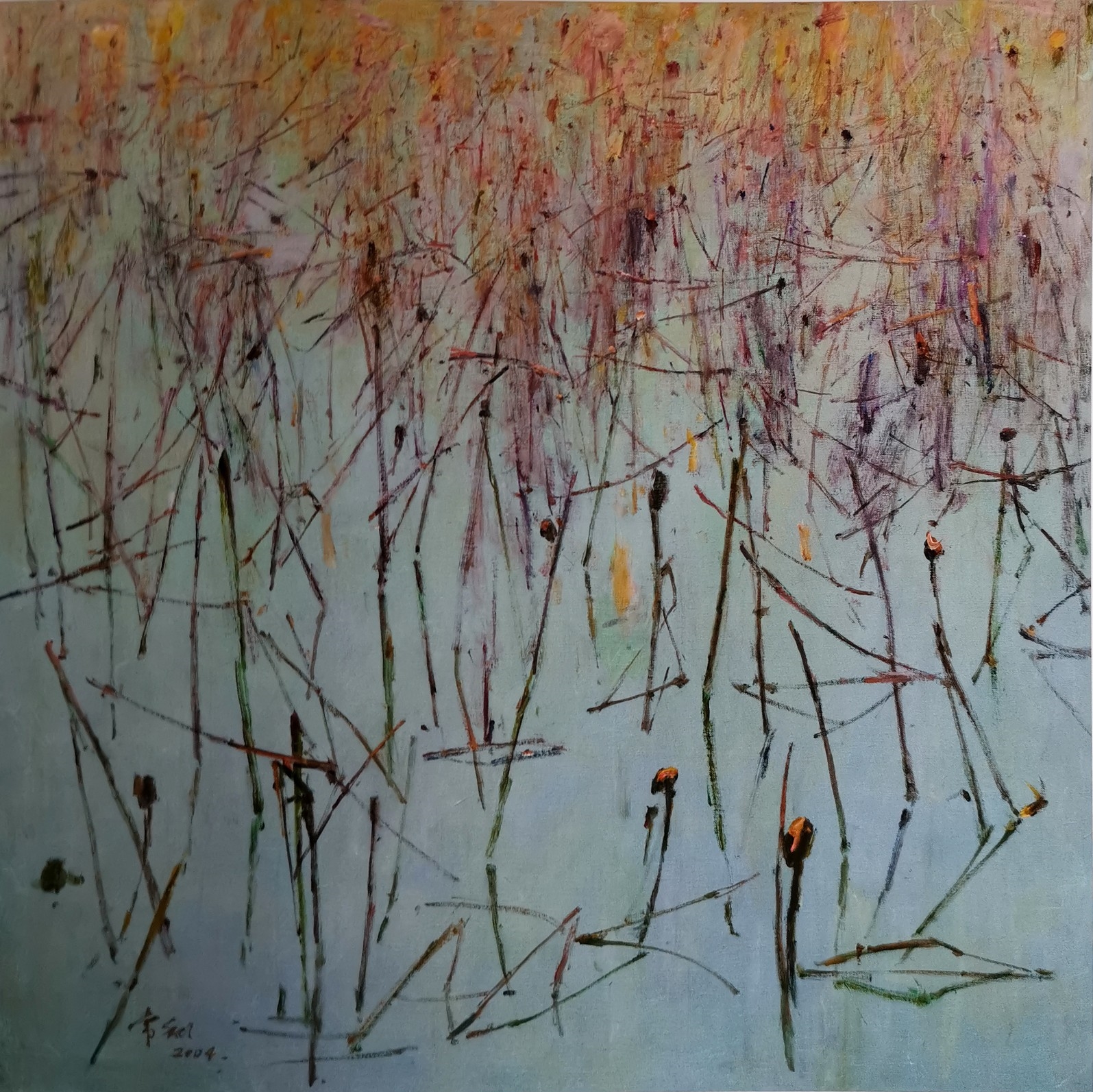After more than two years of preparation, a year’s pandemic postponing, and several months of on-site installation, on Saturday, April 23, 2022, the 59th International Art Exhibition of La Biennale di Venezia, titled The Milk of Dreams, officially kicked off at the Giardini and the Arsenale. The exhibition includes the work of 213 artists from 58 countries and is curated by Cecilia Alemani and chaired by Roberto Cicutto. Three-day pre-opening was organized on April 20, 21, and 22, the Awards Ceremony and Inauguration was subsequently held on April 23, and several featured prizes have been revealed during the Awards Ceremony and Opening at Ca’ Giustinian, Venice.
Awards Ceremony and Inauguration
It was previously announced on March 8 that the German artist Katharina Fritsch and the Chilean artist Cecilia Vicuña won the Golden Lions for Lifetime Achievement of the 59th International Art Exhibition of La Biennale di Venezia. As Cecilia Alemani stated that Fritsch’s contribution to the field of contemporary art, especially sculpture, has been incomparable. She creates figurative works that are both hyperrealistic and fanciful: copies of objects, animals, and people, faithfully rendered in every detail, but transformed into uncanny apparitions. While she also addressed that in the visual arts, Vicuña’s work has ranged from painting, to performance, all the way to complex assemblages. Her artistic language is built around a deep fascination with Indigenous traditions and non-Western epistemologies.

The Golden Lion for Lifetime Achievement of the 59th International Art Exhibition of La Biennale di is awarded to Cecilia Vicuña
Photo by Jacopo Salvi Source: La Biennale Di Venezia Instagram

The Golden Lion for Lifetime Achievement of the 59th International Art Exhibition of La Biennale di is awarded to Katharina Fritsch
Photo by Jacopo Salvi Source: La Biennale Di Venezia Instagram
Besides the Golden Lions for Lifetime Achievement, the Golden Lion for the Best Participant in the International Exhibition The Milk of Dreams was given to Simone Leigh from New York City, USA, while Silver Lion for a Promising Young Participant in the International Exhibition The Milk of Dreams was awarded to Ali Cherri from Paris, France. In addition, two special mentions participants were also decided by the jury—Lynn Hershman Leeson from San Francisco, USA and Shuvinai Ashoona from Kinngait, Nunavut.
 Golden Lion for Best Participant to Simone Leigh Photo by Jacopo Salvi Source: La Biennale Di Venezia Instagram
Golden Lion for Best Participant to Simone Leigh Photo by Jacopo Salvi Source: La Biennale Di Venezia Instagram
 Silver Lion for a Promising Young Participant to Ali Cherri Photo by Jacopo Salvi Source: La Biennale Di Venezia Instagram
Silver Lion for a Promising Young Participant to Ali Cherri Photo by Jacopo Salvi Source: La Biennale Di Venezia Instagram

Special Mention to Lynn Hershman Leeson, Exhibition View Photo by Jacopo Salvi Source: La Biennale Di Venezia Instagram
 Special Mention to Shuvinai Ashoona, Exhibition View Photo by Jacopo Salvi Source: La Biennale Di Venezia Instagram
Special Mention to Shuvinai Ashoona, Exhibition View Photo by Jacopo Salvi Source: La Biennale Di Venezia Instagram
Regarding the situation of national participation, Sonia Boyce: Feeling Her Way featured by the Great Britain Pavilion with Emma Ridgway as the curator, won the Golden Lion for Best National Participation. The exhibition is comprised of tessellating wallpapers, golden geometric structures, and colour-tinted moving-image works that immerse the space in the sound of Black British female vocalists, embodying feelings of freedom, power, and vulnerability. The central work shows the singers as they meet, improvise, and perform acapella together for the first time, demonstrating the potential of collaborative play as a route to innovation, a central tenet of Boyce’s practice.
 Golden Lion for Best National Participation to the Great Britain Pavilion Photo by Jacopo Salvi Source: La Biennale Di Venezia Instagram
Golden Lion for Best National Participation to the Great Britain Pavilion Photo by Jacopo Salvi Source: La Biennale Di Venezia Instagram Exhibition View of The Great Britain Pavilion Source: La Biennale Di Venezia
Exhibition View of The Great Britain Pavilion Source: La Biennale Di Venezia
Moreover, two special mentions have been awarded to the French Pavilion and the Uganda Pavilion. The French Pavilion is in recognition of and gratitude for the long-standing exchange of ideas and solidarity as the idea of building communities in the diaspora. The Uganda Pavilion, which participates for the first time at the Biennale Arte, was also awarded in acknowledgment of their vision, ambition and commitment to art and working in their country. This year, the French Pavilion is featured by Les rêves n’ont pas de titre / Dreams have no titles, while the Uganda Pavilion presents RADIANCE: They dream In Time.
 View of Special Mention as National Participation to the French Pavilion Photo by Jacopo Salvi Source: La Biennale Di Venezia Instagram
View of Special Mention as National Participation to the French Pavilion Photo by Jacopo Salvi Source: La Biennale Di Venezia Instagram
 Exhibition View of The French Pavilion Source: La Biennale Di Venezia
Exhibition View of The French Pavilion Source: La Biennale Di Venezia
 Special Mention as National Participation to the Uganda Pavilion Photo by Jacopo Salvi Source: La Biennale Di Venezia Instagram
Special Mention as National Participation to the Uganda Pavilion Photo by Jacopo Salvi Source: La Biennale Di Venezia Instagram
 Exhibition View of The Uganda Pavilion Source: La Biennale Di Venezia
Exhibition View of The Uganda Pavilion Source: La Biennale Di Venezia
Obviously, the 59th edition of this traditional great show has been deeply influenced by a new era shaped by the pandemic and subsequent challenges. When President Roberto Cicutto recalled the working style of this edition and his collaboration with Cecilia Alemani, “virtual” and “online” have been addressed as the keywords. “For almost two years we met virtually, framed by a computer screen, and it is through that same screen that Cecilia has visited hundreds of artists’ workshops and studios around the world, poring over paintings, sculptures, videos, installations and examples of performance art that must have given her a very different view from the one she would have experienced in the flesh. Whether all this has greatly influenced the spirit of her exhibition, I cannot say. But observing so many imaginary worlds from the porthole of her spaceship/computer, with the aim of physically bringing them to Venice to display them to the world, was most certainly an exceptional and unique experience.”
 Cecilia Alemani and Roberto Cicutto Photo by Jacopo Salvi Source: La Biennale Di Venezia Instagram
Cecilia Alemani and Roberto Cicutto Photo by Jacopo Salvi Source: La Biennale Di Venezia Instagram
 Exhibition View of The Central Pavilion Photo by Jacopo Salvi Source: La Biennale Di Venezia Instagram
Exhibition View of The Central Pavilion Photo by Jacopo Salvi Source: La Biennale Di Venezia Instagram
 Exhibition View of The China Pavilion Photo by Jacopo Salvi Source: La Biennale Di Venezia Instagram
Exhibition View of The China Pavilion Photo by Jacopo Salvi Source: La Biennale Di Venezia Instagram

Exhibition View of The Italia Pavilion Photo by Jacopo Salvi Source: La Biennale Di Venezia Instagram
Selected Media Evaluation
“For the first time in the 127-year history of the Venice Biennale, the world’s oldest and most important contemporary art fair features a majority of female and gender non-conforming artists, under the curatorial direction of Cecilia Alemani.”
—Associated Press
“This year’s event is a lopsided affair, with a forceful central exhibition but disappointing national pavilions. Stan Douglas (Canada) packs a punch and Simone Leigh (U.S.) stands out for her aspiration.”
—Jason Farago, NYTimes
“So far, Russian oligarchs—whose sleek megayachts were once Biennale fixtures—haven’t been spotted in town. It is unclear whether that is because of optics or because plenty of such vessels were recently confiscated by global authorities.”
—Kelly Crow, WSJ
“It is an epochal shift in attitudes. For the very first time, there are many more women than men, everywhere from the Giardini to the Arsenale and specifically in the main group exhibition that takes place in both. A whole cast who have been waiting in the wings for far too long are now playing front of stage. The 59th edition will go down in history as the women’s biennale.”
—Laura Cumming, The Guardian
“The 59th Venice Biennale – back after an extended, pandemic-imposed hiatus – does not disappoint, with history-making moments and iconic installations with a progressive approach and themes of freedom, touch, and the power of coming together.”
—Vogue
“The main exhibition across both sites is the strongest I’ve seen over the last four art biennales I’ve attended, with a central theme of change, transformation and the surreal — a fitting one for the times we live in. It’s a cohesive show, while previous years have felt like a loose theme that brings works together this is a much tighter curation that flows well. There are some outstanding works on display with a strong showing of female artists including a standout Paula Rego display featuring her paintings and sculpture. I also loved the mirroring of giant sculptures of an elephant by Katharina Fritsch and head by Simone Leigh that greet visitors at the two respective sites.”
—Tabish Khan, FAD Magazine
Editor’s Picks: What to See at the Venice Biennale 2022
01 Selected Works in the 2022 Venice Biennale’s Main Show (Photo by Haupt & Binder, Universes in Universe及Alex Greenberger/ARTnews)

Barbara Kruger, Untitled (Beginning/Middle/End). 2022 Site-Specific installation.

Solange Pessoa, Paintings, 2020-2021, In the background is a work by Tau Lewis.

Sandra Vásquez de la Horra, Las Cordilleras Encontradas. 2017-2021. Installation.

Delay Morelos, Installation, Soil, mixed media.

Gabriel Chaile, Several works, 2022, Metal Structure, adobe, bricks.

Exhibition View of Works by Simone Leigh and Belkis Ayón.

Exhibition View of Works by Prabhakar Pachpute and Ali Cherri.

Time capsule V: Seduction of the Cyborg, works by Lavinia Schulz & Walter Holdt.

Louise Bonnet, Pisser Triptych. 2012-2022. Oil on linen.

Precious Okoyomon, Site-specific installation.

Virginia Overton, Installation.

Marianne Vitale, Bottles and Bridges: Advances in Collective Obliteration. 2021. Installation.

Works by Bronwyn Katz and Amy Sillman.
 Thao Nguyen Phan, First Rain, Brise Soleil, 2021
Thao Nguyen Phan, First Rain, Brise Soleil, 2021
 Safia Farhat, Gafsa & ailleurs, 1983.
Safia Farhat, Gafsa & ailleurs, 1983.
 Miriam Cahn, unser suden sommer, 2021, 5.8.2021 (detail), 2021.
Miriam Cahn, unser suden sommer, 2021, 5.8.2021 (detail), 2021.
02 National Pavilions You Won’t Want to Miss
The American Pavilion: Simone Leigh has populated the whole of Jeffersonian-inspired building with her stoic, idiosyncratic figurative sculptures. Newly commissioned for the American Pavilion, these monumental works synthesize references to the African diaspora and early Black American history.

Simone Leigh: Façade, 2022. Thatch, steel, and wood, dimensions variable. Satellite, 2022. Bronze, 24 feet × 10 feet × 7 feet 7 inches (7.3 × 3 × 2.3 m) (overall). Courtesy of the artist and Matthew Marks Gallery. Photo by Timothy Schenck. © Simone Leigh
The French Pavilion: This pavilion features sets inspired by films such Luchino Visconti’s The Stranger (1967) and Orson Welles’s F For Fake (1973), along with a film of Zineb Sedira’s own making and art related to the research she complied. The exhibition mined a legacy of anti-colonial activism in a way that was by turns hopeful and moving.

Zineb Sedira, ‘Les rêves n’ont pas de titre’ (Dreams Have No Titles), 2022, exhibition view, French Pavilion at the 59th Venice Biennale. Courtesy: © Zineb Sedira/DACS, London and kamel mennour, Paris; photograph: Thierry Bal
The Great Britain Pavilion: Sonia Boyce, who is the first Black woman to represent Great Britain at the Venice Biennale, focuses on the under-acknowledge contributions of Black British musicians to culture of their country. The pavilion suggests a form of togetherness in a community that has long been made invisible in the British mainstream.
 Sonia Boyce, ‘Feeling Her Way’, 2022, exhibition view, British Pavilion at the 59th Venice Biennale. Courtesy: © Sonia Boyce/DACS, London and the British Council; photograph: Cristiano Corte
Sonia Boyce, ‘Feeling Her Way’, 2022, exhibition view, British Pavilion at the 59th Venice Biennale. Courtesy: © Sonia Boyce/DACS, London and the British Council; photograph: Cristiano Corte
The Latvia Pavilion: Surreal painted porcelain sculptures sprawl across the Latvian Pavilion but none of them are of the dramatic scale typically seen in the Biennale pavilions. Although al of them impress by virtue of their weirdness, they offer a rare moment of pure and unfettered visual pleasure.
 Skuja Braden(Ingūna Skuja and Melissa D. Braden), Selling Water by the River, 2022(Installation View). Photo: Kristine Madjare. © and Courtesy the Artists
Skuja Braden(Ingūna Skuja and Melissa D. Braden), Selling Water by the River, 2022(Installation View). Photo: Kristine Madjare. © and Courtesy the Artists
葡萄牙馆:佩德罗·内维斯·马奎斯的展览以居住在缓慢漂移宇宙飞船上的吸血鬼为主题,呈现了三部带有恐怖和科幻元素的电影并以对身体转变的温柔冥想为特色。尽管电影中的生物看起来像我们人类,但它们已经被边缘化到与我们不再生活在同一个星球上。
 Pedro Neves Marques, Vampires in Space, Screenshot of the Film, Courtesy the Artist and Umbigo Magazine
Pedro Neves Marques, Vampires in Space, Screenshot of the Film, Courtesy the Artist and Umbigo Magazine
The Portugal Pavilion: Themed on vampires that inhabit a slowly drifting spacecraft, Pedro Neves Marques’s show features three films with horror and sci-fi trappings and a tender meditation on bodily transformation. The creatures in the films look like us but they have been marginalize to a point where they no longer live on the same planet.
The Brazil Pavilion: For Jonathas de Andrade, his home country of Brazil is an ailing body in need of a cure. Thus the structure of this pavilion entrance was set as one gigantic sculpture of an ear. Once visitors get through, they are confronted with a video in which rhythmically cut zooms into people’s hands and feet are interspersed with shots of upheaval in Brazil.

Brazil Pavilion at the Venice Biennale, The Work by Jonathas de Andrade (Photo: labiennale.org)
The Romania Pavilion: Adina Pintilie reconfigures some footage from Touch Me Not which won the Berlin Film Festival’s top award in 2018 into two new video installations for the Romanian Pavilion. While paying much attention to disabled and largely non-heterosexual individuals, Pintilie tries to foster a more expansive definition of intimacy and great empathy between her interviews and the viewer.

Adina Pintilie, ”Tu esti un alt Eu - O catedrala a corpului" (You Are Another Me - A Cathedral of the Body), Exhibition View, Courtesy the Romania Pavilion
The Australia Pavilion: Marco Fusinato performs live playing an electric guitar in his sound installation DESASTRES. While he plays, a complex technological loop spits out images that were generated by plugging in undisclosed terms into search engines.

Marco Fusinato, Score for DESASTRES, 2022. Facsimile on Edition Peters manuscript paper, 45.5 x 30.3 cm. Courtesy the artist and Anna Schwartz Gallery.
The Korean Pavilion: Situated on a hill overlooking the sea and with a theme on "Gyre," the Korean Pavilion showcases six works by artist Yunchul Kim, including a fluid, colorful and dynamic installation. As the theme suggests, space seems to expand infinitely, creating a vortex.

Yunchul Kim, “Chroma V”, Korean Pavilion, Courtesy of the artist. Photographed by Yuna Park/Heraldcorp.com
The Nordic Pavilion: It was remade in honor of Sámi, the only Indigenous people native to Europe. There are works by Pauliina Feodoroff, Máret nne Sara and Anders Sunna that allude to the carnage wrought on the Sami by Nordic colonialism.
 Anders Sunna, ‘Illegal Spirits of Sápmi’, 2022, exhibition view, Sámi Pavilion at the 59th Venice Biennale. Courtesy: the artist and the Office for Contemporary Art Norway; photograph: Michael Miller
Anders Sunna, ‘Illegal Spirits of Sápmi’, 2022, exhibition view, Sámi Pavilion at the 59th Venice Biennale. Courtesy: the artist and the Office for Contemporary Art Norway; photograph: Michael Miller
References and Extended Reading:
1. ARTnews: The 10 Best National Pavilions at the 2022 Venice Biennale, Ranked
https://www.artnews.com/list/art-news/artists/venice-biennale-2022-best-national-pavilions-1234626216/
2. FRIEZE: The 59th Venice Biennale Review: National Pavilions Part 1-2
https://www.frieze.com/article/59th-venice-biennale-national-pavilions-reviews-round-up-2022-part-two
3. Artsy: 10 Highly Anticipated Pavilions at the Venice Biennale 2022
https://www.artsy.net/article/artsy-editorial-10-highly-anticipated-pavilions-venice-biennale-2022
4. ArtReview: Venice Biennale 2022: Three Pavilions To See in the Arsenale
https://artreview.com/venice-biennale-2022-three-pavilions-to-see-in-the-arsenale/
5. Observer’s Venice Biennale 2022 Picks
https://observer.com/list/observers-venice-biennale-2022-picks/
6. The Guardian: Venice Biennale: women outnumber male artists in main halls for first time
https://www.theguardian.com/artanddesign/2022/apr/22/venice-biennale-female-artists-outnumber-males-for-first-time?fr=operanews
7. The Art Newspaper: All the top exhibitions to see during the Venice Biennale in 2022
https://www.theartnewspaper.com/2022/02/03/the-best-exhibitions-to-see-during-venice-biennale-2022
8. W Magazine: What to See at the Venice Biennale https://www.wmagazine.com/culture/what-to-see-2022-venice-biennale-main-exhibition-museums-galleries
9. ARTnews: The Best Art in the 2022 Venice Biennale’s Main Show, From Fragrant Sculptures to Kinky Body Horror https://www.artnews.com/list/art-news/artists/2022-venice-biennale-main-show-best-works-1234626068/
News Roundup on the 59th International Art Exhibition of La Biennale di Venezia by CAFA ART INFO.
Courtesy of LA BIENNALE DI VENEZIA and related news. Check the References for more info. Edited and Translated by Sue, Emily, Luo Yifei/CAFA ART INFO



























